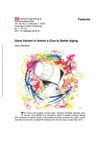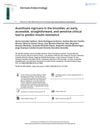Search
for
Sort by
Research
60-90 / 1000+ results
research Polycystic Ovary Syndrome: Diagnosis, Pathophysiology, and Contemporary Therapeutic Approaches
Early diagnosis and personalized treatment are crucial for managing PCOS and preventing complications.

research Melatonin Receptors and Their Role in Human Diseases
Melatonin receptors, found in many body parts, can help treat various diseases like depression and diabetes due to their effects on inflammation, tumor progression, sleep disorders, and body mass regulation.

research Parameters of Obesity in Polycystic Ovary Syndrome
Obesity is common in PCOS patients and early treatment is important for their heart and metabolic health.
research Sebaceous Gland, Hair Shaft, and Epidermal Barrier Abnormalities in Keratosis Pilaris with and without Filaggrin Deficiency
Keratosis pilaris is often linked to genetic mutations and causes skin and hair abnormalities, regardless of those mutations.

research Polycystic Ovary Syndrome: Overview and Treatment
The document says PCOS is a common hormonal disorder in women, diagnosed by certain criteria, and managed with lifestyle changes and various medications.

research Obesity and the Skin: Skin Physiology and Skin Manifestations of Obesity
Obesity affects skin health, causing conditions like acanthosis nigricans and may require different treatment approaches.

research Changes in the PCOS Phenotype with Age
PCOS symptoms change with age; younger women have higher androgen levels and less metabolic issues, while older women face more metabolic challenges despite milder PCOS symptoms.
research Acne Keloidalis Nuchae: A Case Series of Four Indian Patients
AKN might be a skin marker for metabolic syndrome.

research The Current Landscape for Direct-to-Consumer Genetic Testing: Legal, Ethical, and Policy Issues
The document concludes that the fast-growing direct-to-consumer genetic testing market lacks sufficient regulation, posing risks to consumers due to questionable test quality and accuracy.
research Genetic Basis of Alopecia Areata
More research is needed to understand the genetic causes of Alopecia areata to develop better treatments.

research Gene Variant in Amish a Clue to Better Aging
A genetic mutation linked to longer life and less disease was found in the Amish, and a drug is being developed to replicate these benefits.
research Optimizing Nutrition for PCOS Management: A Comprehensive Guide
Proper nutrition can help manage PCOS symptoms and improve overall health.

research Consensus on Women's Health Aspects of Polycystic Ovary Syndrome: The Amsterdam ESHRE/ASRM-Sponsored 3rd PCOS Consensus Workshop Group
Experts agree that PCOS affects women's health in complex ways, but more research is needed to understand and treat it effectively.
research Antiandrogenic Progestins for Treatment of Signs of Androgenisation and Hormonal Contraception
Certain hormone medications can treat symptoms like acne and unwanted hair, regulate periods, and prevent pregnancy in women and teenage girls.

research Assessment of Symptoms and Diet Intake in Young Adults with Polycystic Ovary Syndrome (PCOS)
Lifestyle changes and medical treatment can help manage PCOS symptoms in young adults.

research Skin Disorders in Overweight and Obese Patients and Their Relationship With Insulin
Obesity is linked to skin conditions like acanthosis nigricans and skin tags, which may indicate high insulin levels.

research The Rotterdam Study: 2018 Update on Objectives, Design, and Main Results
The Rotterdam Study updated findings on elderly health, focusing on heart disease, genetics, lifestyle effects, and disease understanding.

research Skin and Metabolic Syndrome: A Review of Possible Associations
Certain medications can impact metabolic syndrome, with some improving conditions like high blood sugar and others having no effect.

research A Thallium-Based Screening Procedure to Identify Molecules That Modulate the Activity of Ca2+-Activated Monovalent Cation-Selective Channels
The conclusion is that a new test was created to find substances that affect specific ion channels, and it works well for drug discovery.

research Skin Manifestations of Obesity: A Comparative Study
Obese people have more skin problems like stretch marks and infections, which get worse with higher obesity levels.

research Obesity in Adults: Position Statement of Various Polish Medical Associations
The conclusion is that obesity should be managed with a slow, balanced approach to diet and exercise, with medication and surgery as additional options, and education and access to care are important.

research Polycystic Ovarian Syndrome: A Comprehensive Review of Symptoms, Diagnosis, and Management
PCOS is a complex disorder managed by treating symptoms and requires a team of specialists.

research Metformin Therapy for the Reproductive and Metabolic Consequences of Polycystic Ovary Syndrome
Metformin has limited effectiveness for improving PCOS symptoms and lacks clear benefits, needing more research to confirm its efficacy.

research Selected Variants of the Melanocortin 4 Receptor Gene (MC4R) Do Not Confer Susceptibility to Female Pattern Hair Loss
MC4R gene variants not linked to female hair loss.

research Alterations in Transcriptome and Antioxidant Activity of Naturally Aged Mice Exposed to Selenium-Rich Rice
Eating selenium-rich rice improved antioxidant activity and signs of aging in mice.

research Testosterone Therapy in Men: Clinical and Pharmacological Perspectives
Testosterone therapy aims to treat hormone deficiencies and various conditions safely and effectively, but requires careful patient monitoring due to potential side effects.

research Androgen Therapy in Women: A Reappraisal: An Endocrine Society Clinical Practice Guideline
The guidelines advise against using testosterone and DHEA in women for most conditions due to safety and effectiveness concerns, but suggest considering testosterone for postmenopausal women with low sexual desire.

research Acanthosis Nigricans in the Knuckles: An Early, Accessible, Straightforward, and Sensitive Clinical Tool to Predict Insulin Resistance
Darkened knuckles can be an early sign of insulin resistance.

research Alopecia Areata: A Multifactorial Autoimmune Condition
Alopecia areata is an autoimmune disease causing patchy hair loss, often with other autoimmune disorders, but its exact causes are unknown.